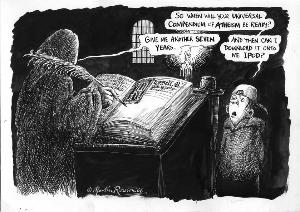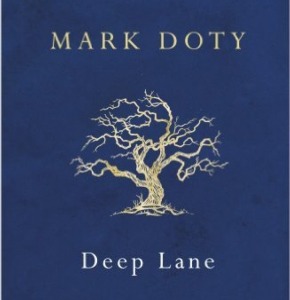It is exactly a hundred years since the American journalist Ambrose Bierce published one of the world’s great works of anti-theistical propaganda. It was called The Cynic’s Word Book (later expanded and renamed The Devil’s Dictionary) and had the sober outward form of a glossary of everyday terms. But it was not conspicuously systematic, and not comprehensive either – in fact the first edition came to a halt at the letter L. Some readers have classed it as a work of humour, but Bierce would not have put it that way: he was a stickler for elegance and concision, and made it known that he was writing only for those “enlightened souls who prefer dry wines to sweet”, in other words those who can tell the difference between mere humour and true wit.
 The wit of the Word Book consists in taking nothing very seriously, except the supreme duty of intellectual agility sustained by a taut literary style. Absurdity, according to Bierce, was woven into the fabric of human experience, and the only remedy was to cultivate a grasshopper’s capacity to leap from one vanity to another, making bonfires as you go. Hence Commendation: “the tribute that we pay to achievements that resemble, but do not equal, our own”; and Congratulation: “the civility of envy”.
The wit of the Word Book consists in taking nothing very seriously, except the supreme duty of intellectual agility sustained by a taut literary style. Absurdity, according to Bierce, was woven into the fabric of human experience, and the only remedy was to cultivate a grasshopper’s capacity to leap from one vanity to another, making bonfires as you go. Hence Commendation: “the tribute that we pay to achievements that resemble, but do not equal, our own”; and Congratulation: “the civility of envy”.
All of which should be borne in mind if you go to Heaven (“a place where the wicked cease from troubling you with talk of their own personal affairs, and the good listen with attention while you expound your own”). And you should not lose hold of your ironical reserve when you meet a Christian (“one who believes that the New Testament is a divinely inspired book admirably suited to the spiritual needs of his neighbour”), or for that matter an Infidel (“in New York, one who does not believe in the Christian religion; in Constantinople, one who does”), or indeed an Egotist (“a person of low taste, more interested in himself than in me”).
Bierce’s astringency is not to everyone’s taste, and when it comes to alphabetically arranged reference books, anti-religionists have usually preferred the work of the astonishing one-man book factory known as Joseph McCabe. McCabe was once a Catholic priest, and when his Christian faith deserted him towards the end of the nineteenth century he turned himself into what you might call a pious atheist, a zealous crusader in a holy war against religion. For the next six decades he would denounce the Catholic Church with a vehemence that often sounded more like Protestant fanaticism than cool rational atheism. He had managed to rid himself of the Christian attitude of humble reverence while retaining a fixed attitude of righteous indignation, and he never surrendered to the embraces of humour, let alone wit.
McCabe claimed that he was interested not in “personal valuations or hopes” but only in plain “historical facts”. He believed he had discovered a “historical law” – let’s call it McCabe’s Law – which states that “atheism grows in proportion to the growth of knowledge and freedom.” At the beginning of the twentieth century, he reckoned, atheism was expanding “a hundred times more rapidly than any religion ever grew”, and only a fool could doubt that the coming decades would witness “a development of atheism immeasurably greater than has ever been known before”. His faith in the progress of reason would then provide the scaffolding for his Biographical Dictionary of Freethinkers (1920) and his Rationalist Encyclopedia (1948), works that provide a kind of roll-call of the saints of rationalism, ranked by their degree of conformity to McCabe’s law.
McCabe’s reference works have been gathering dust for many decades, and Bill Cooke – former president of the New Zealand Rationalist Association – allowed himself to be persuaded a few years ago that anti-religionists stood in need of a new dictionary for altered times. It was a brave undertaking, but his Dictionary of Atheism, Skepticism, and Humanism appears at an inauspicious time, when the entire future of reference books is in doubt. Those who might once have invested in hard copies of, say, the Oxford Dictionary of National Biography, Encyclopedia Britannica, or of the Oxford English Dictionary, can now save time and space by subscribing to the web-based versions, which are far more searchable and constantly updated. And those of us who cannot afford these Rolls-Royces of the reference world can get free rides on the information superhighway thanks to Google or Wikipedia.
But Cooke’s Dictionary is meant to be much more than a compendium of curious information: it is also an attempt to define the identity of humanism as a global movement with a heroic tradition behind it and a glorious prospect ahead. There are several recent works of great distinction that throw light on particular elements of this past (David Berman’s History of Atheism, for instance, Martin Priestman’s Romantic Atheism, and Jonathan Israel’s Radical Enlightenment), but Cooke transcends their local focus by invoking a world-wide Great Tradition of anti-theistical activity. He confesses that he himself was driven into rationalist activism by a personal crisis, precipitated (see Cooke, Bill) when “a fundamentalist sect intervened in his relationship with one of its members”, but his Dictionary – unlike McCabe’s Encyclopedia – does not give much space to the byways of theology and religious practice. Instead of treating with the enemy, Cooke focuses on rationalism as a positive cause in its own right.
The project is not free of difficulty, however, and the title itself registers a certain hesitation. Cooke is well aware that Atheism, Skepticism and Humanism are by no means the same thing, and for all his desire to keep his cast of worthy characters on message, he also knows that he cannot prevent outbreaks of deism amongst skeptics (Voltaire, for example), or spiritualism amongst humanists (Besant), or anti-humanism in the ranks of atheists (consider Nietzsche).
Cooke has a steady nerve, however, and despite all the setbacks that rationalism encountered in the last century (see Stalinism), he has contrived to keep faith with McCabe’s law. He is convinced (see Culture Wars) that the whole of history can be reduced to a struggle between “two broad groups”: on the one hand the reactionaries, or “people with religious worldviews and/or social conservatives”, and on the other the “social progressives … whose religious world views are more liberal”, or “people whose world view is secular”. So he offers approving biographical sketches of the more familiar heroes of rationalism – such as Richard Carlile, Diderot, George Eliot, Hume, Ibsen, Robert Owen and Paine – and rescues many others from obscurity (De Robigne Mortimer Bennett, for example, and GW Foote, Lucretia Mott, Amrital Bhikkubai Shah and Aroj Ali Matubbar).
If you don’t have much stomach for piety, however, you will not be moved by Cooke’s eagerness to qualify his humanist heroes as ‘martyrs’. Nor will you have much use for his 20-page ‘Calendar’ of secular saints, which lists a clutch of ‘progressive’ causes to be celebrated for every day of the year. And pious or not, you will be perplexed by Cooke’s revelation about the Greek philosopher Axiothea, whom we are invited to praise in spite of the fact that “we know nothing about her life or philosophy.”
Cooke is silent on the topic of wit, though he does note that humour is “one of the most important senses a human being can possess” and “the key to a successful marriage”. On the other hand he is unrivalled in his coverage of committees, councils and institutes: anyone needing to sort out the differences between the Indian Humanist Union, the Indian Radical Humanist Association, and the Indian Rationalist Association will be in Cooke’s debt, as will those wanting to track down African Americans for Humanism, the Nigerian Humanist Movement, the International Humanist and Ethical Union, the Uganda Humanist Association and the World Union of Freethinkers.
Other inclusions are harder to explain: Arms Trade, Commonwealth, Classical Music, Conceptual Art, Cubism, Homer, International Atomic Energy Agency, International Monetary Fund, Modern Art, Oil Shocks, Pink Floyd, and Pop Art are worthy fields of inquiry, no doubt, but Cooke does nothing to explain their admittance to an already overcrowded Dictionary of Atheism, Skepticism, and Humanism.
Further swathes of forest might have been spared if Cooke had refrained from offering progressive comments on everything from the World Trade Organisation (“for all its faults, a positive force for the good”) to Relativism (“incoherent”), Postmodernism (“in decline”) and Abstinence, which, in Cooke’s opinion, is “liable to encourage hypocrisy”, though “effective as a means of avoiding sexually transmitted diseases”. I’m afraid my own mind keeps jumping back a hundred years to the impious Bierce on the Abstainer: “a weak person who yields to the temptation of denying himself a pleasure”; or the Total Abstainer, “who abstains from everything, but abstention, and especially from inactivity in the affairs of others.” ■
Jonathan Rée is a writer, philosopher and historian

